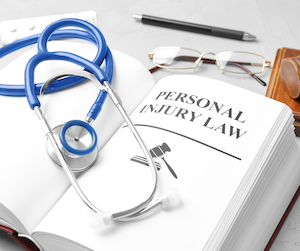Understanding Negligence in Texas Personal Injury Cases

Personal injury law encompasses various concepts that determine the outcome of your claim. From understanding what qualifies as personal injury to grasping the nuances of negligence, knowledge in this realm can empower you. Moreover, recognizing the types of damages available, whether economic or non-economic, shapes the strategy of your case.
As you navigate your options, being aware of the statute of limitations in Texas is essential for your legal standing. In this article, we will explore these key elements to help you understand how long you have to file a personal injury lawsuit in Texas and what factors may influence your decision.
Understanding Personal Injury LawUnderstanding personal injury law in Texas is crucial if you are involved in an accident. This type of law focuses on cases where someone is injured due to another's negligence. Common examples include car accidents, slips and falls, and medical malpractice.
If you are hurt, it's vital to know your rights. Texas law allows injured parties to seek compensation. This may cover medical bills, lost wages, and other related costs. It's essential to act quickly, as Texas has a two-year statute of limitations for these cases.
Here’s a quick list to keep in mind if you are involved in a personal injury case in Texas:
- Document Everything: Collect evidence such as photos, witness statements, and medical records.
- Report the Incident: Inform local authorities or property owners immediately.
- Consult an Attorney: Lawyers can help navigate the legal process and ensure fair compensation.
Understanding these concepts can help protect your rights and ensure you take the right steps after an injury.
Key Concepts in Personal InjuryPersonal injury law covers a wide range of issues when someone is harmed due to another's actions. It's vital to understand the key elements, such as what constitutes a personal injury and the role of negligence. Familiarity with these concepts can help you navigate legal situations if you or someone you know is injured.
Definition of Personal InjuryPersonal injury refers to harm caused to a person's body, mind, or emotions. It does not include damage to property. Common sources of personal injuries are accidents like car crashes, falls, or medical mistakes. When harmed, individuals can make a legal claim for compensation. This is to cover costs like medical care and lost earnings.
Negligence ExplainedNegligence is a key part of personal injury law. It occurs when someone fails to act with care, leading to another person's injury. This can happen in many situations, like when a driver is careless, or a doctor makes a mistake. To win a negligence case, you must show that the responsible person did not act as a careful person would. Listing actions or providing evidence that demonstrates this lack of care can be helpful.
Understanding these concepts is crucial for protecting your rights and ensuring you take the correct steps after an injury.
Types of Damages in Personal Injury CasesWhen involved in a personal injury case in Texas, it's vital to understand the types of damages you might claim. Damages are the monetary compensation awarded to injury victims. These damages fall into two main categories: economic and non-economic. Each has its unique purpose and guidelines.
Economic DamagesEconomic damages are intended to cover financial losses you have suffered due to the injury. These are tangible costs that can be calculated. Some common forms of economic damages include:
- Medical Expenses: Covers the cost of hospital stays, surgery, prescriptions, and therapy.
- Lost Wages: Compensation for income you have missed due to being unable to work.
- Property Damage: Reimbursement for any property that was damaged during the incident.
- Future Medical Costs: Estimates for ongoing treatment or therapy that you might need.
These damages are often documented with receipts, bills, and pay stubs. This makes them easier to calculate than non-economic damages.
Non-Economic DamagesNon-economic damages are more subjective. They compensate for non-financial losses that affect your quality of life. These might include:
- Pain and Suffering: Awards for physical pain and emotional distress.
- Emotional Distress: Covers anxiety, depression, or trauma due to the injury.
- Loss of Enjoyment: When injuries prevent you from participating in hobbies or activities you enjoyed before.
- Loss of Consortium: For impact on family relationships caused by the injury.
Non-economic damages are harder to quantify. However, they are just as crucial in ensuring fair compensation for the injured. Understanding both economic and non-economic damages helps in building a stronger case. This knowledge ensures you seek complete compensation for all your losses.
Impact of Comparative FaultIn Texas, comparative fault plays a key role in personal injury cases. This rule helps decide how much each person is responsible for in an accident.
Impact of Comparative Fault- Shared Responsibility: If a person is partly to blame for their own injury, their compensation is reduced. For example, if you are found 20% at fault, your award is reduced by 20%.
- 50% Rule: Texas follows the "51% bar rule." If someone is over 50% responsible, they cannot receive any compensation.
- Proof: Gather solid evidence to minimize your fault percentage.
- Legal Advice: Consult a personal injury lawyer for navigating comparative fault laws.
Understanding comparative fault is crucial. It can greatly affect the outcome of your personal injury claim in Texas.
Get Help From an Experienced Personal Injury Lawyer in TexasAn experienced personal injury attorney in Harris County, Galveston County, Fort Bend County, Montgomery County, Brazoria County, Houston, Sugar Land, Missouri City, and Stafford, Texas at Thornton Esquire Law Group, PLLC will take over the case from the very beginning and make sure that you receive fair compensation for your injuries. A personal injury lawyer will help you recover medical expenses, lost wages, pain and suffering, and other losses due to the accident. Contact us today at www.thorntonesquirelawgroup.com for a free case evaluation consultation.
